Introduction
Vitamin D2 (ergocalciferol) and D3 (cholecalciferol) can be found in different foods including fatty fishes, meat, eggs and some mushrooms. Both compounds are (indirectly) involved in a number of biological functions in the body, including bone metabolism and enhancement of intestinal absorption of calcium, iron, magnesium, phosphate and zinc. A regular intake of vitamin D therefore is essential.


Standard C18 columns are not able to fully separate the two vitamins. A very hydrophobic phase with a higher carbon coverage and therefore a greater density of C18 chains is required. The highly hydrophobic phase YMC-Triart C18 ExRS (carbon load 25%!) is able to separate these two. The isocratic HPLC method for vitamin D2 and D3 separation, using a 5 μm YMC-Triart C18 ExRS column, can easily be transferred to a UHPLC method using a 1.9 μm column reducing the analyse time by 50%. Furthermore, the resolution can be increased resulting in a full baseline separation.





